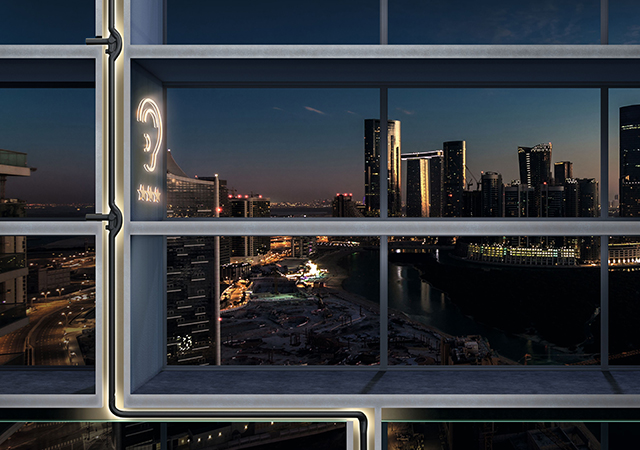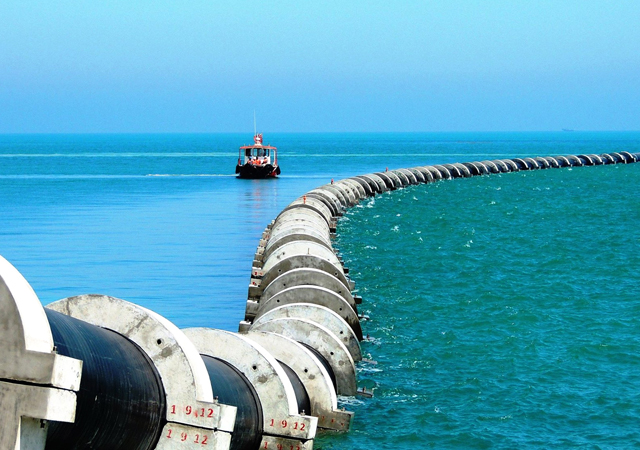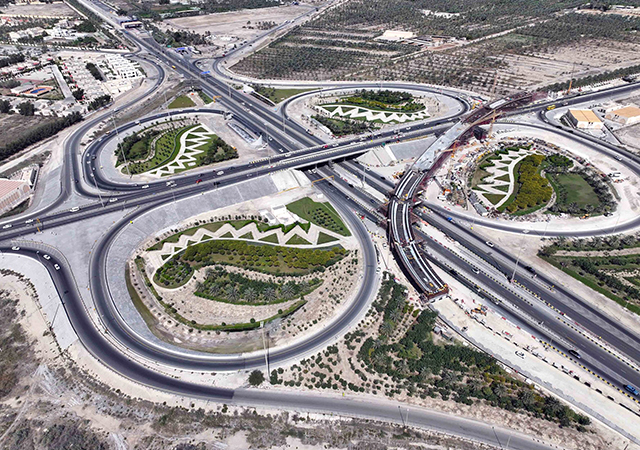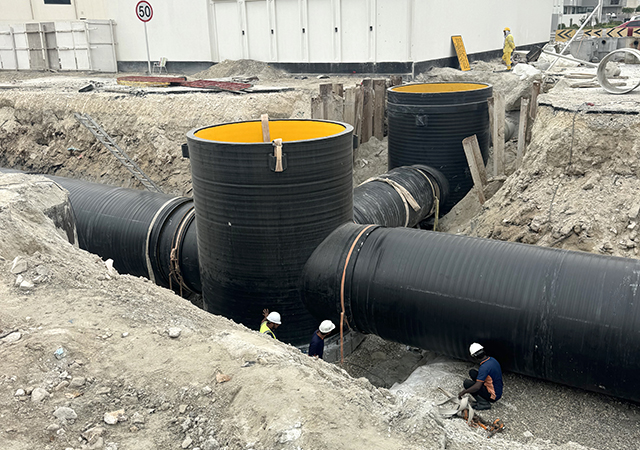
 Bahrain Pipes offers a wide range of products including PE, PP-R, PVC, CPVC, and Flex Pipes.
Bahrain Pipes offers a wide range of products including PE, PP-R, PVC, CPVC, and Flex Pipes.
Bahrain Pipes, a prominent manufacturer of plastic pipes and fittings in the region, is leveraging advanced technology and its innovative product ranges to expand its footprint across the GCC and North Africa.
In an exclusive interview with Gulf Construction, General Manager Bishara Khalil sheds light on the company’s role in driving infrastructure excellence through cutting-edge technology and sustainable solutions.
Bahrain Pipes is preparing to launch a new line of high-density polyethylene (HDPE) corrugated pipes for stormwater and wastewater applications. Designed based on extensive market feedback, these pipes are lightweight, flexible, impact-resistant, easy to install and utilise efficient and relatively fast production technology.
“In the build-up to this project, we conducted a market survey to understand the problems and concerns that contractors and end-users face and we believe our new offering will solve their challenges and stand out against the competition because of its technical superiority,” Khalil reveals.
He adds that with a life span exceeding 100 years and recyclability built in, the new range aligns with modern sustainability and performance benchmarks.
Established in 1995, Bahrain Pipes has built a strong reputation for manufacturing high-quality plastic pipes and fittings, serving prestigious projects such as the King Abdulaziz International Airport in Jeddah, Bahrain International Airport, Bahrain Exhibition Centre, Mall of Iraq, Crown Plaza Hotel Petra Jordan, and the Royal Court Aqaba, Jordan.
 |
|
Jasra Interchange Project ... Bahrain Pipes supplied large-diameter HDPE pipes with SN16 stiffness for 6-m deep installations in challenging silty soil and high water tables. |
Solutions for infrastructure challenges
Highlighting some of its newly completed projects in Bahrain, Khalil says Bahrain Pipes’ involvement in significant infrastructure projects showcase its problem-solving capabilities.
The Jasra Interchange Project, for instance, presented unique challenges, where the company supplied large-diameter HDPE pipes (ID1,400 mm) with SN16 stiffness for 6-m deep installations in challenging silty soil and high water tables. Leveraging KRAH technology, Bahrain Pipes fabricated customised pipe parts and manholes on-site, enabling the project to navigate complex urban infrastructure and avoid costly service clashes. The company also developed innovative HDPE couplers for connections between Polycrete and HDPE pipes, and installed ID3,000-mm 8-m-deep HDPE manholes that are readied for future upgrades, such as lifting stations, ensuring long-term reliability through a welded, leak-resistant HDPE system, Khalil explains.
Similarly, the Zinj Trunk Sewer Project involved deep installations at 6 m below ground. Bahrain Pipes provided a long-term sustainable solution by supplying high-stiffness (SN12) HDPE structural pipes, exceeding competitor offerings, he points out. The company again employed KRAH technology for specialised fabricated parts and on-site manhole fabrication to navigate urban obstacles. Logistical complexities were managed through precise pipe part fixation, equipment movement in trenches, and continuous de-watering to control groundwater.
Bahrain Pipes also played a key role in the Bilaj Al Jazayer development, a flagship infrastructure project in Bahrain. Its rapid delivery of customised HDPE manholes enabled the installation of up to six manholes per week, ready for immediate connection. These prefabricated units offered remarkable on-site flexibility and reduced costs, contributing to the project’s overall efficiency and sustainability.
Khalil notes the “unmatched flexibility” of HDPE manholes, which allowed for efficient, low-cost, and high-speed on-site modifications, contributing to the project’s long-term sustainability.
“Bahrain Pipes continues to partner with its customers, the contractors, consultants and distributors in the region, to deliver products that serve the market’s needs and strives to exceed customers’ expectations,” he adds.
 |
|
Bahrain Pipes is involved in significant infrastructure projects in the region. |
Advanced manufacturing technologies
Central to Bahrain Pipes’ growth strategy is continuous technological advancement. The company recently adopted a new PVC extruder with integrated direct dosing technology from Battenfeld-Cincinnati, a technology leader in the extrusion industry. This innovation eliminates the need for pre-mixing, ensuring material homogeneity and energy efficiency, while producing smooth, high-quality three-layer PVC wastewater pipes that meet stringent international standards.
“Introducing new materials into pipe cores is of great interest for the production of PVC pipes, as material costs still account for the majority of the production expenses,” he says. “This multilayer technology also ensures glossy, perfectly smooth inner and outer layers for the wastewater pipes produced at Bahrain Pipes, while meeting the quality requirements of international standards.”
Bahrain Pipes offers a wide range of products including PE, PP-R, PVC, CPVC, and Flex Pipes, and is now adding HDPE corrugated pipes for wastewater and stormwater drainage applications.
“Good products need to serve the application requirements efficiently and effectively, which requires development in the design of the product as well as its manufacturing process. This means we need to always keep abreast of the latest technology to ensure our customers are reaping the benefits of competitive pricing and, very importantly, long-term satisfactory performance of the system,” he emphasises.
The company continually expands its offerings to cater to market demands and explores new construction applications through dedicated R&D efforts.
“Our partnerships with top-tier suppliers and commitment to international standards allow us to consistently deliver high-quality, cost-effective solutions for the water, drainage and sewage sectors as well as building commercial and residential markets,” Khalil affirms.
Bahrain Pipes adheres to rigorous quality assurance protocols. Its manufacturing processes are certified to ISO 9001, ISO 14001, and ISO 45001 standards. Product certifications include WRAS, NSF, SKZ, and the Kitemark, ensuring compliance with global benchmarks for potable water, drainage, and sewage systems.
Strategic growth and regional vision
Looking ahead, Bahrain Pipes aims to strengthen its presence across the Middle East and North Africa (MENA) region. Its central location in Bahrain, coupled with sales offices in several Gulf countries, provides logistical advantages and proximity to key markets.
Sustainability also remains a core priority. In addition to ISO 14001 certification, Bahrain Pipes has adopted solar energy in its operations and continually improves energy efficiency to reduce CO₂ emissions. All products are recyclable and designed to minimise non-revenue water (NRW) losses.
“Our long-term vision is to offer innovative, sustainable solutions that contribute to the region’s infrastructure transformation. With a clear strategy and a strong focus on quality and technology, Bahrain Pipes is well-positioned to support the next generation of infrastructure development,” Khalil concludes.

















.jpg)













 (1).jpg)













































